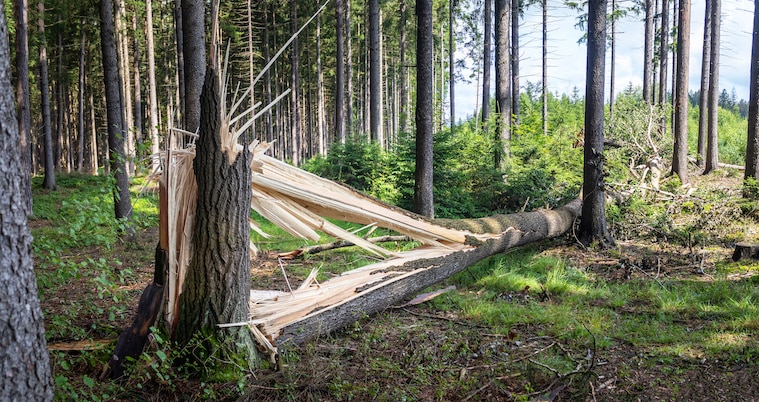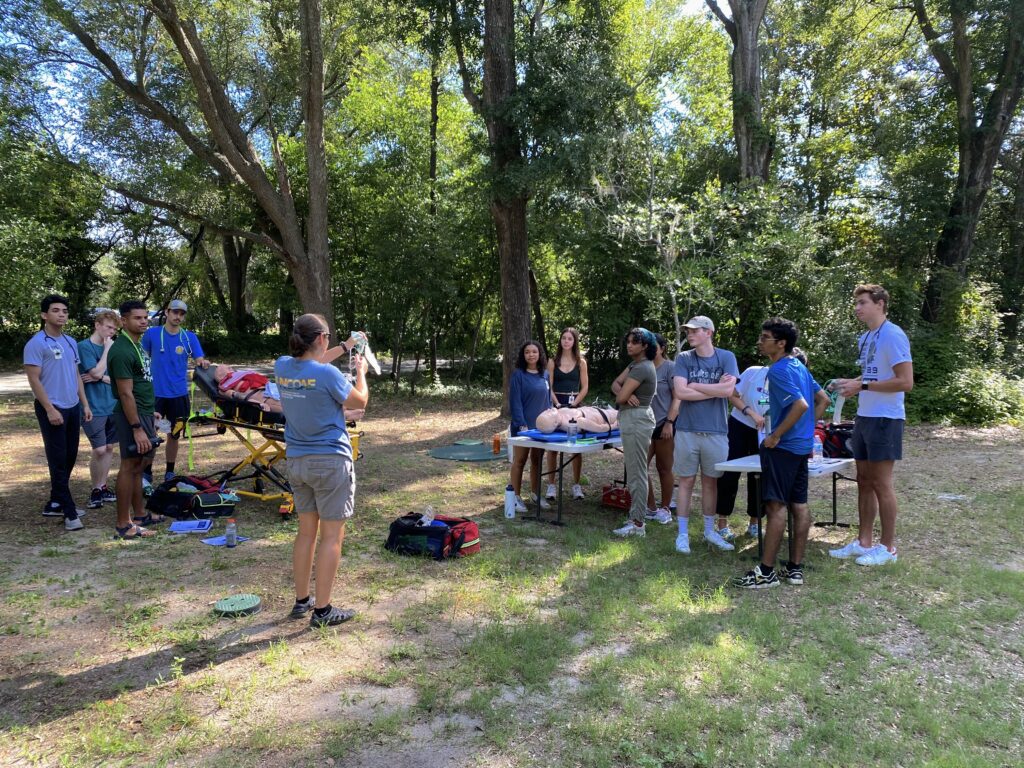Avoiding Target Fixations and Incident Pits in the Backcountry
Risk Management“Look where you want to go!”
I have conveyed this message to wilderness course participants countless times, shouting, screaming, and using hand signals when necessary. Sometimes I’m yelling above the roar of a set of rapids or the sound of an adjacent waterfall.
“Look where you want to go!”
I emphatically issue the same advice while watching climbers rappelling down a cliff, or verbally guiding a student on a mountain bike through a sketchy section of trail. In each case, the point of my shouting is to get the students to stop looking at the obstacle.
“Look where you want to go” really translates as “Stop looking at the obstacle! Don’t fixate on the hazard!”

And it doesn’t matter if you’re a Wilderness First Responder approaching the scene of a backcountry incident, or a student on a wilderness course attempting to navigate a perceived hazard or obstacle, looking too closely at a hazard you want to avoid can be very dangerous.
At first glance — no pun intended — you might think it wise to actually look closely at the hazard you want to avoid. No argument there. You absolutely need to identify obstacles, especially in the backcountry and other places considered Wilderness. In fact, identifying an obstacle is a key factor in remaining safe.
But here’s the thing: (more…)
Most EMS Terminology Comes Down to Initials, Abbreviations and Acronyms
EMT TrainingA few years ago, we ran a three-part series on slogans, slang, and terminology as it applies to a trio of human-powered outdoor recreational activities. If you recall, we started out with some “gnarly” surfing terms, then we “tied in” to a conversation about climbing, finally pulling a “wet exit” on the language of paddling.
You can review these three articles using the links below:
- From Sept. 20, 2020: Surfing Terminology and Slang: You Can’t Play BINGO Without the Lingo
- From Oct. 10, 2020: On Belay — Climbing Terminology and Slang
- From Oct. 30, 2020: Paddling Terminology and Slang: Nobody Says ‘Up a River Without an Oar’
There was quite a bit of word whimsy in those articles, and we made sure to remind readers that successfully lassoing the linguistics of a particular activity was no guarantee you were mastering that particular sport professionally.

Today we’re taking a more serious look at language, this time highlighting the terminology used by members of the Emergency Medical Service (EMS) community. That’s because one of our areas of focus here at The National Center for Outdoor & Adventure Education (NCOAE) is emergency medicine training and education. And whether you’re an EMS, medical professional, or wilderness first responder (WFR), these terms are most often employed when these professionals find themselves managing a medical emergency.
First off, you might notice that most of these terms come in the form of acronyms, abbreviations, and initials, and the reason for that is to enable first responders to quickly communicate and react with each other and the patient in the field.
The source for these acronyms comes from the NCOAE Wilderness Medicine Field Guide (ISBN 978-0-578-87449-4).
Here, we present them in alphabetical order: (more…)
When it Comes to Wilderness, Is it an Adventure or Experience?
Outdoor EducationYears ago, I was working in wilderness-based setting with a group of gang members who were attempting to break away from the often-violent lifestyle in which they found themselves. During a break our programming, I asked a loaded question.
“Anybody want to tell me about their tattoos and what they mean?”
The 30 or so gang members, hailing from a variety of organizations — MS-13, Bloods, Crips and Latin Kings — stared up at me. Hard. One participant in the back shouted, “Nobody gives a shit about our tattoos!”

When I burst out laughing, I was met with even harder stares, I realized an explanation was in order. I told the participants that everyone wants to know about their tattoos. They’re just too afraid to broach the subject.
I said that if we were to put a person covered in tattoos from head to toe on a scale, and then somehow remove all that ink on their skin and weighed them again, the weight change would probably be undeterminable.
If, however, that same tattooed gang member walked into a job interview, the weight of those tattoos — what they represented — would be a thousand pounds. So again, I asked them to tell me the stories and histories behind their tattoos. What followed was an enlightening experience. The curtain was pulled back and these folks opened up and shared the significance behind their body art.
My point is this: Words and images have weight.
Words and Images Have Weight
I tell you this because a leading outdoor industry retailer — REI (Recreational Equipment, Inc.) — recently announced an adjustment to their marketing, based on patterns they say are cropping up in our culture today. REI’s announcement that the company is rebranding its tour business from REI Adventures to REI Experiences caught many people I know off guard, myself included.
It’s an effort, they say, to increase their participant base to three million clients a year. The company’s officers and administrators fear the word “Adventure” is getting in the way of its effort to grow the business.
So, what is it we think when a brand that builds a $3.7-billion-a-year business around catering to adventurers decides to change the word to experiences instead? Is adventure too heavy of a word? Is the term adventure dangerous? Are we — both consumers and outdoor community members — becoming soft?
What comes next? Will the (more…)
TALK TO US
Have any further questions about our courses, what you’ll learn, or what else to expect? Contact us, we’re here to help!